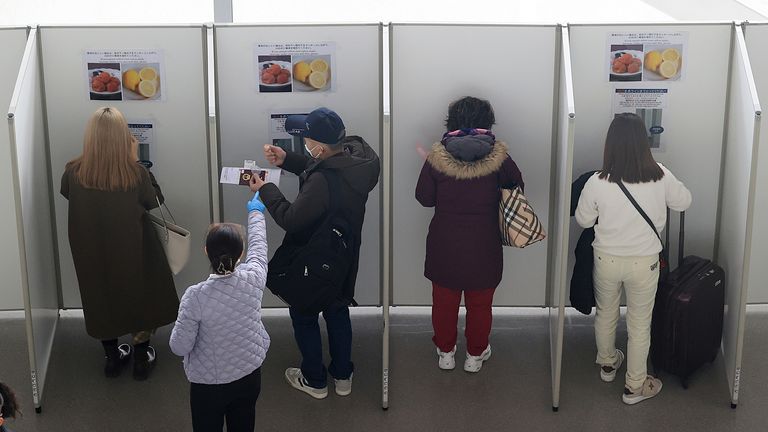
China has suspended issuing short-term visas for South Koreans, in the first retaliatory move against countries imposing COVID curbs on Chinese travellers.
The Chinese embassy in Seoul said on WeChat that its policy will be adjusted subject to South Korea lifting its “discriminatory entry restrictions” against China.
Beijing has been accused by the World Health Organisation of withholding data on the state of the COVID outbreak in China, and several countries have followed the US in requiring negative coronavirus tests for those coming from China.
South Korea is among the growing list of countries, including France and Japan, which have imposed border restrictions on travellers from China over concerns about COVID infections following the country’s recent reopening.
From Thursday, short-term visas for Chinese nationals will be suspended until the end of the month.
Arrivals from China will also be required to provide a negative PCR result, taken within 48 hours of the beginning of the journey to South Korea, or a rapid antigen test taken within 24 hours.
People travelling from China to South Korea are already required to take a PCR test upon arrival.
The announcement comes a day after China’s foreign minister Qin Gang expressed concern about the restrictions in a call with his South Korean counterpart Park Jin.
Seoul said its decision was made on scientific grounds, and suggested both countries work together to help stabilise the situation, South Korea’s foreign ministry said.
The ministry added that it held prior discussions with Beijing after being informed of its move, and will once again convey its position.
Read more:
Patients build up outside entrances at hospitals in China
China threatens retaliation over COVID testing rules for travellers
Seoul’s restrictions focus on ‘safety’
South Korea’s President Yoon Suk-yeol said the country’s quarantine and border measures should focus strictly on the safety of its citizens without political considerations.
“No country in the world considers quarantine and border control issues to be a diplomatic, political, economic or trade issue,” he told a meeting with health officials on Monday.
“So any developed country in the world would do that. That’s science, and we should only care about the safety and health of the people.”
China reopened its borders to travellers from abroad for the first time in nearly three years on Sunday.
While the rule change means people will no longer have to quarantine on arrival, some countries have raised concerns over the number of COVID-19 infections in China.
Beijing has stopped publishing daily infection tallies and although the country has been reporting five or fewer deaths a day since the policy U-turn, health experts say the figures are inconsistent with funeral homes reporting a surge in demand for their services.











